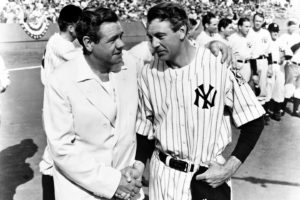You couldn’t pitch the real life story of baseball legend Lou Gehrig to a Hollywood producer today without being quickly shown the door. Yes people are fascinated with star athletes, but the story of Gehrig’s rise to fame and sad demise is one that even the most talented of writers wouldn’t dare to script.
In July of 1942 – just a year after the hall of fame ballplayer succumbed to Amyotrophic Lateral Sclerosis (now commonly referred to as Lou Gehrig’s Disease) saw the release of “The Pride of the Yankees” – a biographical pic that serves less as a baseball movie and more a showcasing effort done to honor the beloved star, who wasn’t just an athlete but a community hero.
Gary Cooper was the A-List royalty of that era, and demonstrates his perfection in acting in the lead role. Cooper possesses a certain degree of shyness, a quality that mimics Gehrig’s actual reputation as a quiet sort, and steals the show. No one alive today actually saw Lou Gehrig play, but Cooper offers an idea of what it would have been like. Viewers will have to remind themselves it isn’t actually footage of Gehrig you’re watching on the screen, and that’s why Cooper’s performance is still lauded, now 76 years later.

To say Lou Gehrig’s life is storybook on its surface would be accurate. A boy growing up in an impoverished Manhattan neighborhood the son of German immigrants, who spends his days pining over his favorite team, the New York Yankees. His talents eventually land him a spot on the historic 1920’s Yankees teams, as a main cog in the infamous “Murderers Row” lineup batting right behind his boyhood hero, Babe Ruth.
“The Pride of the Yankees” covers all its bases in the effort at showcasing Gehrig and an unbelievable time period. Director Sam Wood provides us a glimpse of Gehrig’s childhood, playing ball in a sandlot in early 1900s New York, to his legendary farewell speech, delivered July 4, 1939 in front of a packed audience at Yankees Stadium. That Babe Ruth appears in the movie as himself only further illustrates the historical significance the film has.
I loved the glimpse of yesteryear; witnessing the early decades of New York City, and a truly mesmerizing and long gone sports culture. Devoid of cable television and instant updates on Twitter, we see neighborhoods of people gathering to watch and root for their favorite teams, reading results in the newspaper, and discussing issues on the street corners. Its enviable to witness such a simple time of family togetherness, all bound over the common topic of the national pastime.
“The Pride of the Yankees” isn’t just a sports movie. It’s a biographical tribute to one of histories first cultural icons. Funny, serious, and downright sad at times, its a film that can be enjoyed by sports and history buffs alike. Its negatives aren’t over glaring, and are typical of any movie from 1942. The historical impact and account of Lou Gehrig’s life is one that will leave you with chills.
by – Matt DeCristo